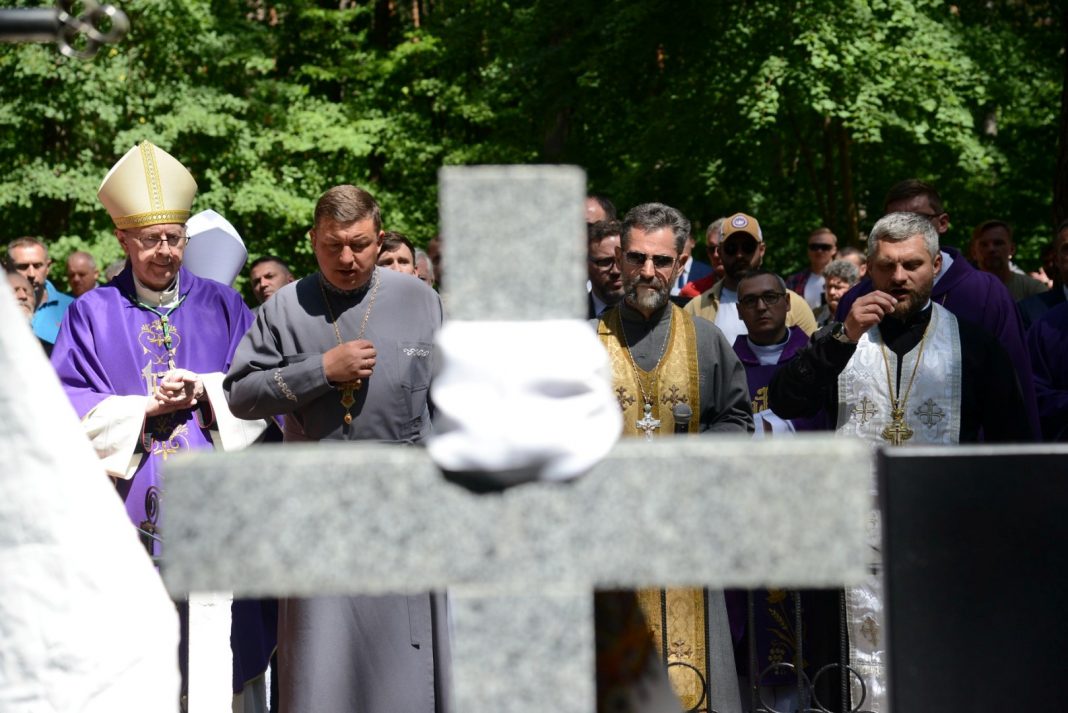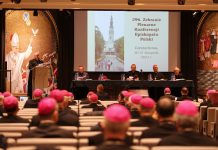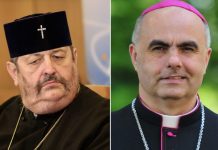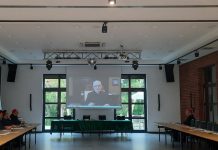Reconciliation can only be built on truth and justice. A sincere acknowledgement of each party’s responsibility – or at least a willingness to seek it – is vital for genuine reconciliation,” said the President of the Polish Bishops’ Conference Archbishop Stanislaw Gądecki in his homily at a Mass celebrated in Parosla, Ukraine, the site of the martyrdom of Poles eighty years ago during the Volhynian Massacre.
“Reconciliation can only be built on truth and justice. A sincere acknowledgement of each party’s responsibility – or at least a willingness to seek it – is vital for genuine reconciliation. . In reconciliation, mutual wrongs cannot be hidden,” the President of the Polish Bishops’ Conference said in his homily. He stressed that “reconciliation should be matched by a readiness to make amends to the extent possible”.
Archbishop Gądecki pointed out that “if we mainly refer to settling old scores, we may further intensify rather than diminish our mutual hostilities and defeat the very cause of reconciliation. If, on the other hand, we speak first and foremost of forgiving each other, we risk that such a hasty reconciliation may be inauthentic. I repeat: both are necessary”. “Evil must be reckoned with; the bodies of those unjustly murdered must be respected and laid in their graves and the whole truth of the crimes committed must be named and acknowledged,” the President of the Episcopate stressed.
In conclusion, Archbishop Gądecki asked the Presidents of Ukraine and Poland and the parliamentary authorities of both nations “to agree to a dignified burial of all the victims of genocide, preceded by the exhumation of the bodies of the murdered, so that their families can finally light a candle and pray over these graves, which have such a great significance for our future”.
The President of the Polish Bishops’ Conference is in Ukraine with a pilgrimage of forgiveness and reconciliation as part of the Church commemorating the 80th anniversary of the Volhynian Massacre. Mass was also celebrated in Parosla at the grave of the first victims of the Volhynian Massacre by Lutsk Bishop Vitaly Skomarovsky and a dozen clergy of the Greek Catholic and Latin rites from Poland and Ukraine. After the Eucharist, a special prayer at the grave of the murdered was sung by the Orthodox clergy. Scouts from the Volhynia troop, who tend to the grave on a daily basis, were present at the ceremony held in a liturgical setting. Among the pilgrims were participants of the VolhyniaMotorcycle Rally.
Press Office of the Polish Bishops’ Conference
Translated by M. Turski, Sr.A.J. Nowaszewska / Office for Foreign Communication of the Polish Bishops’ Conference
The complete homily follows:
Archbishop Stanisław Gądecki
Forgiveness and Reconciliation, Holy Mass (Parosla, Ukraine – 8.07.2023)
We meet today for the Eucharist in the no longer existing village of Parosla I. Before World War II, it was a Polish hamlet consisting of 26 households. This place was a witness to a cruel crime. Its inhabitants were not expecting an attack, and so a sotniaof the Ukrainian Insurgent Army entered the village without difficulty, pretending to be Soviet partisans, and then set up guards near the Polish homesteads.
Later, the bound and defenceless villagers were murdered by the attackers with knives and axes. Between 149 and 173 people were killed, including women, children, and infants. Only 12 (or 8, according to other sources) Poles, mostly children, managed to survive. The property of those killed was looted and stolen. The village ceased to exist.
News of this crime spread the very next day. Poles from the area began to flock to the burned down village. They took the wounded to the hospital in Volodymyr and asked the Germans from Antonovka to cover them. Under their protection, they managed to bury the murdered and take photographs of the bodies.
Back in 1943, the first cross was erected there to commemorate those killed; this cross is no longer there today. Later, in the forest, on the site of the former colony, Ukrainian Anton Kovalchuk erected a commemorative cross with the information that the crime was committed by Ukrainian nationalists.
This was the first mass murder by the Ukrainian Insurgent Army on this site against the Polish population on 9 February 1943; it is considered to be the onsetof the Volhynia Massacre.
- FORGIVENESS AND RECONCILIATION
As we stand in this tragic place on the 80th anniversary of the massacre, we are compelled to address an exceptionally difficult issue of Polish-Ukrainian forgiveness and reconciliation. This is called for by the fact that tens of thousands of innocent people, including women, children, and the elderly, primarily Poles, but also Jews, Armenians, Roma, and Ukrainians, who rescued their neighbours and relatives who were in danger, became further victims of crimes, ethnic cleansing, and genocide. The sacrifice of their lives invites us to profound reflection, followed by fervent prayer for forgiveness and reconciliation.
In his teaching, Jesus repeatedly calls us to demonstrate a generosity of heart towards our neighbours who have trespassed against us. Jesus reveals to us God as the Father who forgives our trespasses to the fullest extent and is the first to reconcile with us. Many parables speak of God’s forgiving people, which is shown as a model of our forgiveness towards others. It is no coincidence that the Gospel according to Matthew, following the text of Our Father, refers specifically to fraternal forgiveness: “Yes, if you forgive others their failings, your heavenly Father will forgive you yours. But if you do not forgive others, your Father will not forgive your failings either” (Mt 6:14-15). Following the example of the Heavenly Father, Christ commands us to forgive, not three or even seven times, but seventy-seven times – which means always. Indeed, not everything in life can be solved by justice alone. No!Where evil is to be put to an end and a new story of grace is to begin, someone must love more than is required.
First of all, however, it is important to note that those seeking to overcome the sense of wrongdoing within themselves often confuse forgiveness with reconciliation. In fact, however, these are two different, if interrelated, experiences.
Forgiveness is an inner experience. It is a personal decision to forgive “those who trespass against us” for all their transgressions and sins committed against us. Forgiveness occurs in the depths of the heart and does not depend on the person of the neighbour. Personal forgiveness of “those who trespass against us” is possible also when reconciliation with them is not yet possible for different reasons. We can offer forgiveness to “those who trespass against us” also when they do not yet feel responsible for the wrongs inflicted and continue to show resentment, animosity, or enmity. Forgiveness precedes reconciliation; it is a prerequisite for true unity and harmony between people. Forgiveness is always possible because it depends solely on the personal decision of our hearts.
Reconciliation, on the other hand, requires the commitment of all parties involved in the conflict. It can only be established after a mutual exchange of forgiveness. Like forgiveness itself, reconciliation is a process. It often takes time and therefore requires patience on all sides. Reconciliation should not be pursued too hastily or under coercion when there is considerable mutual resistance and resentment between the parties. Forgiveness and the associated mercy are also expressed in patience in the face of the inability of “those who trespass against us” to reconcile with us.
For reconciliation to be genuine, the conflicting parties must first acknowledge their own responsibility. Reconciliation can only be built on truth and justice. A sincere acknowledgement of each party’s responsibility – or at least a willingness to seek it – is vital for genuine reconciliation. In reconciliation, mutual wrongs cannot be hidden. It is furthermore good and proper if both sides can express these wrongs to each other. Reconciliation should be matched by a readiness to make amends to the extent possible. More often than not, compromise on both sides, combined with an attitude of mutual understanding and reaching out to each other, is necessary.
There can be no permanent reconciliation when one party to the conflict unfairly shifts the entire burden of responsibility to the other party. Nor can there be a fruitful and effective reconciliation in which – “for the sake of peace”, out of a perverse sense of guilt or misconceived responsibility – one of the parties takes all the blame solely on itself. Nor is a true and lasting reconciliation possible when one party “underplays” the other. While in such a situation an outward rapprochement may occur, a sense of regret and injustice usually remains ingrained in the hearts. Each party should contribute to reconciliation according to its own responsibility and its own capacity. If the path of reconciliation were to begin by making claims towards each other and recounting the extent of each other’s faults, reconciliation itself would in many situations be very difficult, if not impossible to achieve. This is because forgiveness and reconciliation require an attitude of generosity on both sides(cf. Fr. Józef Augustyn, Pain of Injustice, Joy of Forgiveness).
- A NEW DIRECTION
The direction we should adopt was shown to us long ago by Holy Father John Paul II in Lviv: “Today, in praising God for the indomitable fidelity to the Gospel of these his Servants, let us feel ourselves gently nudged to recognize the infidelities to the Gospel of not a few Christians of both Polish and Ukrainian origin living in these parts. It is time to leave behind the sorrowful past!
The Christians of the two nations must walk together in the name of the one Christ, towards the one Father, guided by the same Holy Spirit, the source and principle of unity. May pardon given and received spread like a healing balm in every heart. May the purification of historical memories lead everyone to work for the triumph of what unites over what divides, in order to build together a future of mutual respect, fraternal cooperation and true solidarity” (John Paul II, Homily during the Holy Mass of Beatification of Archbishop Józef Bilczewski and Fr. Zygmunt Gorazdowski, Lviv, 26.06.2001).
Applying this perspective, we should express our highest admiration to Cardinal LubomyrHusar, who decided to make the following declaration during the said meeting of the Ukrainian people with the Holy Father: “We recognise that there were also dark and spiritually tragic moments in last century’s history of our Church. It was a fact that some sons and daughters of the Ukrainian Greek Catholic Church committed evil, sadly – intentionally and voluntarily – against their neighbours from their own nation and from other nations. In your presence, Holy Father, I wish to ask forgiveness for all of them from God, the Creator and Father of us all, and from those whom we, the sons and daughters of this Church, have wronged in any way. Lest the terrible past weigh upon us and poison our lives, we willingly forgive those who have wronged us in any way. We are confident that, in a spirit of mutual forgiveness, we may calmly enter into the celebration of this Eucharist with you, in the knowledge that in doing so we enter a new and better century with sincere and strong hope” (CardinalLubomyrHusar, John Paul II’s pilgrimage. Lviv, 26 June 2001).
Pope Francis, in turn, in his address on Wawel Hill, drew our attention to good and bad memory: “In the daily life of each individual and society, though, there are two kinds of memory: good and bad, positive and negative. Good memory is what the Bible shows us in the Magnificat, the canticle of Mary, who praises the Lord and his saving works. Negative memory, on the other hand, keeps the mind and heart obsessively fixed on evil, especially the wrongs committed by others” (Wawel, 27.07.2016). Poland and Ukraine, the lands which have for long centuries known the message of the Gospel and have offered ample witness of sainthood of their daughters and sons, must finally tell each other: “we offer forgiveness and ask for it”.
If we mainly refer to settling old scores, we may further intensify rather than diminish our mutual hostilities and defeat the very cause of reconciliation. If, on the other hand, we speak first and foremost of forgiving each other, we risk that such a hasty reconciliation may be inauthentic. I repeat: both are necessary. Evil must be reckoned with; the bodies of those unjustly murdered must be respected and laid in their graves and the whole truth of the crimes committed must be named and acknowledged.
We all, even the most righteous among us, whether we like it or not, knowingly or otherwise,have various egocentric biases. When the problem of wrongs arises, both those we have inflicted on others and those we have suffered from others, this egocentric bias inevitably comes to the fore. Indeed, if we want to honestly learn the truth about the injustice, we try to overcome our dependence on subjective judgements. Yet even when one is well-meaning, the picture of the same events will be marked by a certain subjectivity on both sides. This is perfectly captured by the Lithuanian proverb popularised by Józef Mackiewicz: “Only one’s own tears are bitter; others’ tears are only wet”(Fr. Jacek Salij).
To stir up old nationalisms and resentments would be to act against Christian identity; it would also be a flagrant anachronism, unworthy of both great nations.
Finally, I call on the Presidents of Ukraine and Poland, and on the parliamentary authorities of both nations, to agree to a dignified burial of all the victims of genocide, preceded by the exhumation of the bodies of the murdered, so that their families can finally light a candle and pray over these graves, which have such a great significance for our future.
CONCLUSION
Jesus, our Peace and Reconciliation, have mercy on us. Amen.

 Polski
Polski








